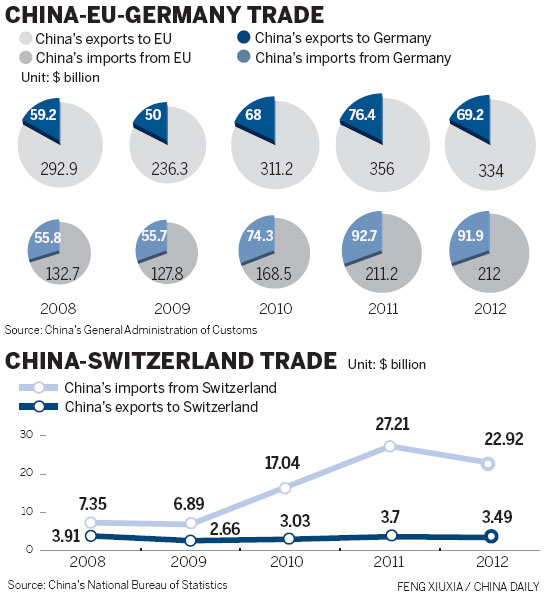Geared to go
Updated: 2013-05-24 09:04
By Fu Jing (China Daily)
|
|||||||||||
Broader agenda
Beyond trade issues and bilateral ties, Islam says Li will probably be asked by his European interlocutors to enlighten them more on how his government is going to realize the so-called Chinese dream.
Islam also says that European experts would also be keen to understand how the new leadership in China pursues its plan of improving its people's lives and how it would tackle important challenges such as pollution, food safety and corruption.
Li will also face questions on how China plans to press ahead with its ties with Japan and other ASEAN countries in light of the recent territorial disputes. He is also likely to be pressed on China's stance regarding nations such as Syria, Iran and Democratic People's Republic of Korea.
"Above all, the EU would also want to know whether it will continue to remain an important trade partner for China in the coming decade," Islam says.
Jiang Shixue, deputy director of the European Studies Institute at the Chinese Academy of Social Sciences, says the new leadership attaches great importance to Europe based on the tremendous progress achieved in previous years.
Trade disputes with Brussels will pose problems for smooth bilateral ties, he says. "There is no doubt that bilateral trade will continue to grow between the two sides as the two depend on each other heavily."
Jiang says that Li, like his predecessor Wen, will strongly express China's concerns such as market economy status, arms embargo and trade disputes during his talks with European leaders.
|
||||
Defraigne says the relationship between the two sides is wobbling because of the weakening of the EU in terms of governance and growth. He adds that the commercial and strategic rivalry among the big three - France, Britain and Germany - eventually undermines the EU's external capacity especially relating to China, which is not in China's long term interest.
The most serious threat against the unity of the eurozone comes from the surreptitious rise in structural unemployment, which is causing growing anxiety among the labor and middle class, he says. Social instability can fuel political tensions and raise social demands for protection against foreign competitors both from within and from outside EU.
"China is especially targeted as the main manufacturing competitor and also as a serious threat for European industrial jobs."
Defraigne feels that Li should stress political unity of Europe and encourage cross-investments, as it would provide the best anti-protectionism buffer.
Though the current status quo of EU-China relations is not too good and worsening, Ford says, Brussels' plan to levy tariffs on Chinese solar panels may queer the pitch further.
Ford says China and Brussels need to work out a coordinated strategy over the coming months and years to change perceptions and rebut inaccurate portrayals of China.
Oliver Brauner, a researcher at the China and International Peace and Security Project of the Stockholm International Peace Research Institute, says former premier Wen had attached great importance to strengthening China-EU ties. With the leadership change there are some concerns on the European side that the new leadership will focus less on the EU and more on the US.
"I think that most people in Europe would like to see some sort of a statement by Li that would underline the continued Chinese commitment to a strong and truly strategic partnership between China and the EU," Brauner says.
Commenting on the current problems between China and Europe, Men Jing, a professor at the College of Europe in Brugge, Belgium, says it is normal to see ups and downs in bilateral relations.
It is important to have a clear vision from both sides, she says.
"This is Li's first visit as premier to Europe and I hope he can really do something to map out the future course of bilateral engagements. I want to see an encouraging start."
Men says that this year marks the 10th anniversary of the EU-China Strategic Partnership and she wants policymakers from both sides to use the opportunity to further boost relations when the leaders meet in Beijing at the end of the year.
Islam agrees. "I think Li should not dwell on long-standing irritants for too long - these questions are unlikely to be solved in the short/medium term and instead of looking at the past, the EU and China should look ahead to the future."
Rana Mitter, professor of history and politics of modern China at the University of Oxford, says Li will need to understand that China has a new role in global affairs, and that includes relations with the EU. The two sides will agree on many issues and disagree on others.
"It is necessary to understand that principled disagreement is a healthy part of a relationship, and it is not possible only to work with partners who agree with you on all points."
Zhang Chunyan in London and Li Xiang in Paris contributed to this story.
fujing@chinadaily.com.cn

(China Daily 05/24/2013 page1)
Related Stories
Lasting impressions, fond memories 2013-05-24 09:04
Gateway to Europe 2013-05-24 09:04
Long-term smart solutions needed 2013-05-24 09:04
Li gets to lay out China's vision 2013-05-24 09:04
Today's Top News
List of approved GM food clarified
ID checks for express deliveries in Guangdong
Govt to expand elderly care
University asks freshmen to sign suicide disclaimer
Tibet gears up for new climbing season
Media asked to promote Sino-Indian ties
Shots fired at Washington Navy Yard
Minimum growth rate set at 7%
Hot Topics
Lunar probe , China growth forecasts, Emission rules get tougher, China seen through 'colored lens', International board,
Editor's Picks

|

|

|

|

|

|









